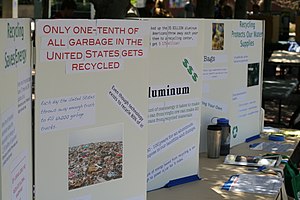Seven Tips On Teaching Your Kids to Be Eco-Conscious
 Colorful Recycling Containers for Trash (Photo credit: epSos.de)#1 Be a good role model. This is perhaps the easiest way to teach your children about the impact of their actions on the environment. Children pay attention to what you do. If you recycle, reuse and pay attention to how you consume, your children will grow up with that example.
Colorful Recycling Containers for Trash (Photo credit: epSos.de)#1 Be a good role model. This is perhaps the easiest way to teach your children about the impact of their actions on the environment. Children pay attention to what you do. If you recycle, reuse and pay attention to how you consume, your children will grow up with that example.#2 Discuss often. Look for learning moments to discuss why you are eco-conscious. For example, when you’re shopping you might choose to purchase an item at a flea market. Explain to your child why you’re buying used instead of new.
#3 Help them explore nature. Nature is what you’re trying to preserve and protect. If your child doesn’t get out and enjoy nature, they won’t have an appreciation for the earth. Take nature hikes. Enjoy the beach. Head to the mountains or take bike rides. Just get some fresh air and sunshine - it's good for their health, and yours too!
 Image via Wikipedia#4 Take field trips. Some recycling centers, landfills and water treatment plants offer tours. Check out your local facilities. What educational experiences are available? If they don’t commonly offer tours, consider visiting them on Earth Day. Show your children what happens to our trash and waste water. Help them learn the cycle of consumption. It’ll help them appreciate what they use.
Image via Wikipedia#4 Take field trips. Some recycling centers, landfills and water treatment plants offer tours. Check out your local facilities. What educational experiences are available? If they don’t commonly offer tours, consider visiting them on Earth Day. Show your children what happens to our trash and waste water. Help them learn the cycle of consumption. It’ll help them appreciate what they use.#5 Garden. Gardening is a wonderful way to appreciate and experience the earth. If you don’t have space outside you can create a windowsill herb garden. Use recycled, reused and organic material to create your garden. For example, tin cans to plant your herb seeds in. Compost to fertilize the soil. Rainwater to water the plants. (Visit our Sustainable Gardening blog for more tips on gardening sustainably, even in a small space.)
#6 Make it a game. Show your children how much water or electricity you use each month. Make it a game to lower your consumption. Turn off the lights when they’re not in use. Use water sparingly. Turn off all appliances. See how much you can reduce your electric, gas or water bill during the month. Then reward children for their efforts.
#7 Volunteer. Become active in outdoor clean ups. If your community has a “clean up the park” day, sign the family up. Volunteer at your recycling center. Or assist the recycling program at community events. For example, many running events have recycling volunteers to make sure all those paper cups from the aid stations end up in the recycling bin rather than the street or the garbage. Show your children that the Earth is important and enlist their help in keeping it clean.
 Happy Children Playing Kids (Photo credit: epSos.de)And most importantly, follow through on your words. If you tell your children that being environmentally conscious is important to you then follow it up with rules. Limit television viewing time. Ask them to turn off the lights. Make sure they don’t take forty-minute showers. Create a recycling center in your home. When it comes to teaching children, follow through is important, and learning these things early will benefit both them and the planet in the long run.
Happy Children Playing Kids (Photo credit: epSos.de)And most importantly, follow through on your words. If you tell your children that being environmentally conscious is important to you then follow it up with rules. Limit television viewing time. Ask them to turn off the lights. Make sure they don’t take forty-minute showers. Create a recycling center in your home. When it comes to teaching children, follow through is important, and learning these things early will benefit both them and the planet in the long run.
No comments:
Post a Comment